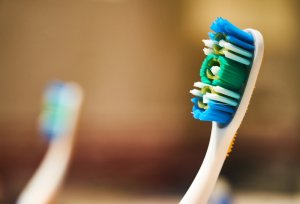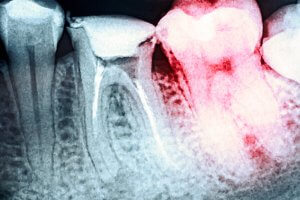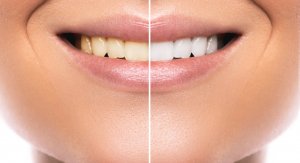Improve your dental health naturally with these natural tooth care tips! Going to the dentist may be unavoidable, but there are some things you can do to minimise the treatment that you’ll need when you do visit.
Studies suggest that natural methods can help maintain good oral hygiene and even heal cavities and reverse tooth decay. By making simple changes to your diet and habits, you can avoid the dreaded dentist’s chair and keep your teeth healthy.
Learn more about natural tooth care and how you can take control of your dental health from the comfort of your own home.
Natural teeth cleaning ideas

If you are looking for natural teeth cleaning solutions that you can make at home, look no further. Natural toothpaste can be a safe and effective way to clean and protect our teeth, so let’s explore a few different ingredients that can be used.
Coconut oil
One effective method is to make your own mineralised toothpaste instead of buying it. Using a DIY remineralising toothpaste made with coconut oil can help you can achieve a brighter smile.
Check out a great recipe for this toothpaste here.
While natural toothpaste can be beneficial, it’s important to note that fluoridated toothpaste remains the most effective way to remineralise and protect teeth against decay.
Baking soda
There’s also a simple recipe for homemade toothpaste without coconut oil that only contains baking soda, sea salt, and peppermint extract. It’s extremely easy to put together and it’s cost-efficient as well. The full recipe can be found here.
Baking soda is known for its ability to neutralise the acid in the mouth, making it a great choice for fighting tooth decay. Baking soda toothpaste can also help whiten teeth and freshen your breath.
Bentonite clay
Bentonite clay is known for its ability to absorb and remove toxins, heavy metals, impurities, and chemicals. This recipe includes bentonite clay to help get your teeth as clean and as healthy as possible. The recipe is also without baking soda in case you prefer a toothpaste that is baking soda free.
Charcoal
Homemade toothpaste with charcoal has become increasingly popular in recent years. Activated charcoal binds to dirt and stains beyond the surface and draws them out, leaving your teeth extremely clean.
People that use activated charcoal in their homemade toothpaste will swear by it and claim that their mouth has never felt cleaner after using it. If you’d like to give it a try, you’ll find more information and recipes in our guide to activated charcoal for teeth.
Homemade toothpowder

Homemade toothpowder is another option if you’d like to make your own home remedies. Tooth powder functions the same as toothpaste, except that you just dip your toothbrush into the powder instead of using a paste.
A good reason to use the powder instead of toothpaste is that it leaves less of a mess in your sink, and it works better with bentonite clay. This is a good recipe for toothpowder.
If you want to know more about what goes into commercial toothpaste and which ingredients you might want to avoid, check out our full article on natural toothpaste. We also have articles about bamboo toothbrushes and plastic-free floss for anyone wanting to reduce their waste.
Can cavities be healed naturally?
There’s no magic pill that will regrow teeth and make them glow, but there is scientifically-backed research that shows it’s possible to remineralise teeth and fight cavity progression naturally.
How is this possible?
The first thing you need to do is follow the advice you’ve heard your whole life; stop eating so much sugar. Sugar not only feeds oral bacteria, but it literally decalcifies and demineralises your teeth.
That means the first thing you have to do if you want any chance of healing your cavities is to stay away from your favourite soft drinks, sweets and cakes, especially if you’re in the habit of consuming them between meals.
Once you eliminate sugary, acidic soft drinks from your diet, the best drinks for your teeth are water and low-sugar vegetable juices.
You might also have heard warnings about phytic acid, which is present in most grains, nuts and beans. Cutting down on these foods can help remineralise your teeth. However, it won’t heal deep cavities, as some research first suggested.

After removing the harmful foods, you need to add in some nutrient-rich foods and raw dairy. Raw dairy is loaded with vitamins and minerals that help maintain strong teeth and promote oral wellness.
Also, try to eat plenty of foods loaded with vitamins and minerals, and avoid fast food and overly processed foods. The vitamins you want to be sure you get enough of are vitamins A, D, E and K. You can also use toothpaste enhanced with certain minerals.
Oil pulling is another helpful method for reversing cavities. Simply swish oil in your mouth for 20 minutes every morning during your normal morning routine.
Yes, 20 minutes is a long time, so if you can’t make it the full twenty, start smaller and build up. Most people recommend using coconut oil or MCT oil for oil pulling.
Watch this video or read our full guide to oil pulling for more information.
This will not only benefit your teeth, but it has also been proven to treat things like headaches and diabetes. Once you’re done, spit your oil in the bin instead of in your sink so you don’t clog your drains. Then rinse your mouth out with salt water for an extra kick of antimicrobial properties. Finally, be sure you are brushing your teeth properly and flossing daily.
Is it possible to reverse tooth decay?

Making sure you have enough minerals in your diet, getting enough fat-soluble vitamins, and using mineral toothpaste and oil pulling can all help fight tooth decay in the very early stages. They also help protect teeth from decay in the future.
Scientists are also working on ways to heal cavities without drilling teeth – but again these methods will only work in the early stages of tooth decay.
If you already have a deep cavity that has reached the dental pulp inside the tooth, you should visit a dentist. This kind of decay is beyond the point of being reversed by natural means, and if not treated it can cause an abscess and require more drastic treatment.
Is it possible to naturally strengthen tooth enamel?
The enamel on your teeth is your body’s hardest and most mineralised substance. Following the remedies above will also help you strengthen tooth enamel naturally.
Some ways to recognise that you’re losing your tooth enamel are if you have developed highly sensitive or yellow teeth, the tips of your teeth look transparent, or your teeth have rounded edges. Rounded edges are also an early sign of tooth erosion, something else you want to take seriously if you notice it.
Can you whiten teeth naturally?

Having a mouth free from decay and cavities still isn’t good enough if you’re walking around with a yellow smile. But there’s good news: there are several natural ways to whiten your teeth as well.
Oil pulling will work to whiten your teeth, and baking soda has natural whitening properties, which is why it’s a popular ingredient in many toothpastes already.
You aren’t going to notice anything overnight, but if you brush with baking soda consistently you will notice a change over time.
Hydrogen peroxide, the same product used in many of the best home teeth whitening kits, is another household remedy you can use to whiten your teeth. However, you do need to be cautious using hydrogen peroxide because there are questions about its safety.
Make sure you’re using a 1.5% or 3% solution. It’s usually sold as a 3% solution, and you can dilute that to a 1.5% solution if you desire.
You can use it as a mouthwash before you brush your teeth, or you can add it to baking soda to create a natural toothpaste. Simply combine 2 teaspoons of hydrogen peroxide with 1 teaspoon of baking soda and brush away.
Apple cider vinegar has been used as a natural cleaning product for centuries and it can also be used to whiten your teeth. Apple cider vinegar has antibacterial properties that can help whiten your teeth as well as your countertops.
However, overuse of vinegar can also erode the enamel on your teeth, so limit its use to once or twice per week.
Check out some of our homemade mouthwash recipes in our guide, which includes natural whitening mouthwash.
Conclusion
Follow these steps and you might notice you don’t have as many problems next time you visit the dentist. If you’re diligent with your oral hygiene and diet, it is possible to naturally reverse early tooth decay and keep your teeth healthy and strong.
Change your diet, change your habits, and change your teeth.
FAQs
What is natural tooth care?
Natural tooth care is an approach to maintaining oral hygiene that involves the use of natural ingredients that are free from artificial flavours, colours, and preservatives.
What are some natural ingredients that are good for teeth?
There are several natural ingredients that are known to promote healthy teeth and gums, including baking soda, coconut oil, tea tree oil, and neem oil.
Is natural toothpaste effective at cleaning teeth?
Yes. Some natural toothpaste can be effective at cleaning teeth. However, not all natural toothpaste contains fluoride, which is the most effective ingredient for preventing tooth decay.
Are there any drawbacks to using natural tooth care products?
Natural tooth care products are generally safe and effective, but it’s important to prioritise fluoride-containing toothpaste to protect teeth against decay and promote remineralisation.
University of Washington School of Dentistry: New cavity treatment offers no drilling, no filling. Consulted 24th December 2022.
Snopes: Reverse Cavities and Heal Tooth Decay with Vitamin D. Consulted 24th December 2022.
Quick and Dirty Tips: Can Cavities Be Healed with Diet? Consulted 24th December 2022.




